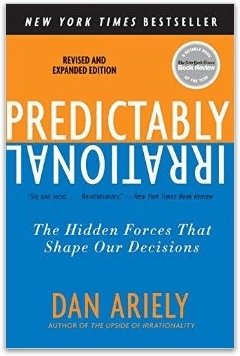Predictably Irrational
by Dan Ariely

Troy Shu
Updated at: February 23, 2024


What are the big ideas? 1. Our choices are heavily influenced by how options are presented to us, making context important in decision-making. 2. Setting a high pri
Want to read ebooks, websites, and other text 3X faster?
From a SwiftRead user:Feels like I just discovered the equivalent of fire but for reading text. WOW, WOW, WOW. A must have for me, forever.
What are the big ideas?
- Our choices are heavily influenced by how options are presented to us, making context important in decision-making.
- Setting a high price as a reference can make other options seem more appealing, showing how initial prices affect our willingness to pay.
- Social norms and market norms affect our actions differently, with social connections often motivating us more than financial incentives.
- First decisions have a lasting impact, setting a precedent for future choices and spending habits.
- Being reminded of moral or ethical guidelines can steer us towards more honest behavior, highlighting the importance of context in ethical decision-making.
Summary
The Influence of Context on Decision Making
- “Humans rarely choose things in absolute terms.”
- “We tend to focus on the relative advantage of one thing over another, and estimate value accordingly.”
- “Most people don’t know what they want unless they see it in context.”
- “Gregg Rapp, a restaurant consultant, discovered high-priced entrées on the menu boost revenue for the restaurant—even if no one buys them.”
- “We are always looking at the things around us in relation to others.”
- “We not only tend to compare things with one another but also tend to focus on comparing things that are easily comparable—and avoid comparing things that cannot be compared easily.”
The Power of First Decisions and Price Perception
- “The more we have, the more we want. And the only cure is to break the cycle of relativity.”
- “Once we buy a new product at a particular price, we become anchored to that price.”
- “The basic idea of arbitrary coherence is this: although initial prices are ‘arbitrary,’ once those prices are established in our minds they will shape not only present prices but also future prices.”
- “Price tags become anchors when we contemplate buying a product or service at that particular price.”
- “The first anchor influences not only the immediate buying decision but many others that follow.”
- “The sensitivity we show to price changes might in fact be largely a result of our memory for the prices we have paid in the past.”
Social Norms versus Market Norms and Behavioral Ethics
- “According to Margaret Clark, Judson Mills, and Alan Fiske, we live simultaneously in two different worlds—one where social norms prevail, and the other where market norms make the rules.”
- “People will work more for a cause than for cash.”
- “No one is offended by a small gift, because even small gifts keep us in the social exchange world and away from market norms.”
- “When a social norm collides with a market norm, the social norm goes away for a long time.”
- “To make informed decisions we need to somehow experience and understand the emotional state we will be in at the other side of the experience.”
- “When we are removed from any benchmarks of ethical thought, we tend to stray into dishonesty. But if we are reminded of morality at the moment we are tempted, then we are much more likely to be honest.”
Questions
- How does seeing something in context affect what you choose or want?
- Have you ever wanted something more just because it was compared to a higher-priced option?
- Why do you think we care about how our choices compare to others?
- Can you think of a time when your first decision on something influenced your future decisions in that area?
- How does the price you first see for something shape what you're willing to pay later?
- Have you noticed a difference in your motivation when working for personal satisfaction versus working for money?
- How do small gifts or acts of kindness affect your relationships differently than monetary transactions?
- Can you recall a moment when being reminded of ethical standards influenced your decision to act more honestly?
Discussion
What do you think of "Predictably Irrational"? Share your thoughts with the community below.